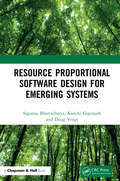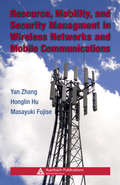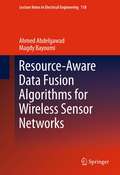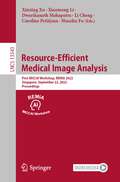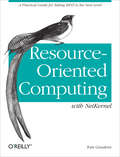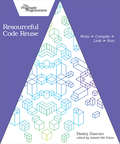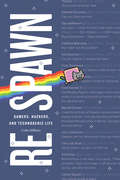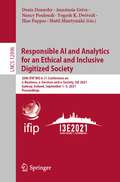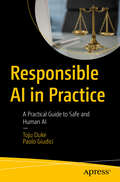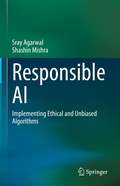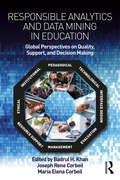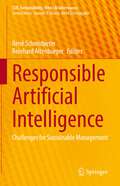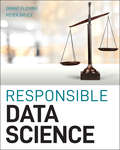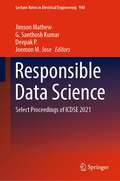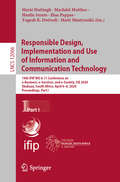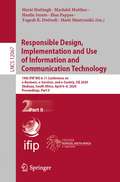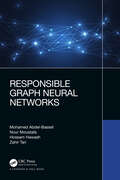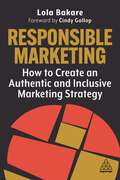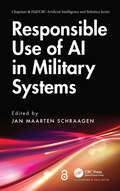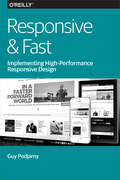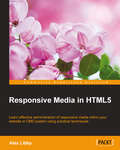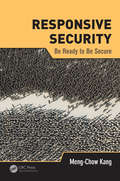- Table View
- List View
Resource Proportional Software Design for Emerging Systems
by Suparna Bhattacharya Kanchi Gopinath Doug VoigtEfficiency is a crucial concern across computing systems, from the edge to the cloud. Paradoxically, even as the latencies of bottleneck components such as storage and networks have dropped by up to four orders of magnitude, software path lengths have progressively increased due to overhead from the very frameworks that have revolutionized the pace of information technology. Such overhead can be severe enough to overshadow the benefits from switching to new technologies like persistent memory and low latency interconnects. Resource Proportional Software Design for Emerging Systems introduces resource proportional design (RPD) as a principled approach to software component and system development that counters the overhead of deeply layered code without removing flexibility or ease of development. RPD makes resource consumption proportional to situational utility by adapting to diverse emerging needs and technology systems evolution. Highlights: Analysis of run-time bloat in deep software stacks, an under-explored source of power-performance wastage in IT systems Qualitative and quantitative treatment of key dimensions of resource proportionality Code features: Unify and broaden supported but optional features without losing efficiency Technology and systems evolution: Design software to adapt with changing trade-offs as technology evolves Data processing: Design systems to predict which subsets of data processed by an (analytics or ML) application are likely to be useful System wide trade-offs: Address interacting local and global considerations throughout software stacks and hardware including cross-layer co-design involving code, data and systems dimensions, and non-functional requirements such as security and fault tolerance Written from a systems perspective to explore RPD principles, best practices, models and tools in the context of emerging technologies and applications This book is primarily geared towards practitioners with some advanced topics for researchers. The principles shared in the book are expected to be useful for programmers, engineers and researchers interested in ensuring software and systems are optimized for existing and next generation technologies. The authors are from both industry (Bhattacharya and Voigt) and academic (Gopinath) backgrounds.
Resource, Mobility, and Security Management in Wireless Networks and Mobile Communications (Wireless Networks and Mobile Communications)
by Yan Zhang Honglin Hu Masayuki FujiseOrganized into three parts, Resource, Mobility, and Security Management in Wireless Networks and Mobile Communications examines the inherent constraint of limited bandwidth and unreliable time-varying physical link in the wireless system, discusses the demand to realize the service continuity in the single-hop or multi-hop wireless networks, and ex
Resource-Aware Data Fusion Algorithms for Wireless Sensor Networks
by Magdy Bayoumi Ahmed AbdelgawadThis book introduces resource-aware data fusion algorithms to gather and combine data from multiple sources (e.g., sensors) in order to achieve inferences. These techniques can be used in centralized and distributed systems to overcome sensor failure, technological limitation, and spatial and temporal coverage problems. The algorithms described in this book are evaluated with simulation and experimental results to show they will maintain data integrity and make data useful and informative. Describes techniques to overcome real problems posed by wireless sensor networks deployed in circumstances that might interfere with measurements provided, such as strong variations of pressure, temperature, radiation, and electromagnetic noise; Uses simulation and experimental results to evaluate algorithms presented and includes real test-bed; Includes case study implementing data fusion algorithms on a remote monitoring framework for sand production in oil pipelines.
Resource-Efficient Medical Image Analysis: First MICCAI Workshop, REMIA 2022, Singapore, September 22, 2022, Proceedings (Lecture Notes in Computer Science #13543)
by Li Cheng Huazhu Fu Xinxing Xu Xiaomeng Li Dwarikanath Mahapatra Caroline PetitjeanThis book constitutes the refereed proceedings of the first MICCAI Workshop on Resource-Efficient Medical Image Analysis, REMIA 2022, held in conjunction with MICCAI 2022, in September 2022 as a hybrid event. REMIA 2022 accepted 13 papers from the 19 submissions received. The workshop aims at creating a discussion on the issues for practical applications of medical imaging systems with data, label and hardware limitations.
Resource-Oriented Computing with NetKernel: Taking REST Ideas to the Next Level
by Tom GeudensTake resource-oriented computing out for a spin with this hands-on introduction to NetKernel, and discover how ROC can improve the way you design and implement software and software systems. Learn how ROC’s new approach combines core ideas from the REST architectural style with the Unix development model. By using NetKernel to create and then string simple services together, you can develop complex systems that scale as easily as the Internet does. Author Tom Geudens helps you create several NetKernel modules right away, and then walks you through the results to demonstrate their effectiveness.Create, test, and document Netkernel modules from scratchLearn the basic principles of ROC’s abstract computing modelDesign an interface in NetKernel that lets you insert, update, delete, and select actions in MongoDBUse the Visualizer to trace information about root requests processed by NetKernelHandle resource requests with DPML—NetKernel’s Declarative-Request Process Markup LanguageCompose modular XML documents with the XML Recursion Language (XRL)Build solutions using nCoDE in NetKernel’s visual editor
Resourceful Code Reuse
by Dmitry ZinovievReusing well-written, well-debugged, and well-tested code improves productivity, code quality, and software configurability and relieves pressure on software developers. When you organize your code into self-contained modular units, you can use them as building blocks for your future projects and share them with other programmers, if needed. Understand the benefits and downsides of seven code reuse models so you can confidently reuse code at any development stage. Create static and dynamic libraries in C and Python, two of the most popular modern programming languages. Adapt your code for the real world: deploy shared functions remotely and build software that accesses them using remote procedure calls. Avoid the drawbacks and harness the benefits associated with seven code reuse models. Create static and dynamic libraries in C and Python, deploy shared functions remotely, and build software that makes intelligent use of remote procedure calls. In no time at all, you'll develop the confidence to reuse code at any stage of real-world development. This one-stop solution covers the complete build cycle: editing, compiling, linking, and running a ready program. Apply Linux/macOS power software development tools, such as ld, ldd, ranlib, and nm, to construct and explore state-of-the-art function libraries in C that could be linked with application-specific code either permanently or for the duration of execution. Learn why Python has modules for reuse and how they differ from C object files and libraries. Understand the risks and other negative implications of sharing and reuse. As a bonus, distill the dependencies between your project's components and automate and optimize your build process with the "make" utility. Whether you are an amateur coder or an experienced developer, become a more productive and resourceful programmer by reusing previously written code. What You Need: To compile and run the C examples mentioned in the book, you need a decent C compiler (GCC is the best, but Intel and Microsoft would probably work, too) and a set of C development tools: maker (make), linker (ld), file, strip, ldd, and ranlib. Again, the GNU development toolset works marvels; other toolsets may or may not work. All examples in the book have been tested on a Linux computer but will most likely work on macOS. For the Python examples, a Python-3.x interpreter is all you want. No third-party modules are required.
Respawn: Gamers, Hackers, and Technogenic Life (Experimental Futures)
by Colin MilburnIn Respawn Colin Milburn examines the connections between video games, hacking, and science fiction that galvanize technological activism and technological communities. Discussing a wide range of games, from Portal and Final Fantasy VII to Super Mario Sunshine and Shadow of the Colossus, Milburn illustrates how they impact the lives of gamers and non-gamers alike. They also serve as resources for critique, resistance, and insurgency, offering a space for players and hacktivist groups such as Anonymous to challenge obstinate systems and experiment with alternative futures. Providing an essential walkthrough guide to our digital culture and its high-tech controversies, Milburn shows how games and playable media spawn new modes of engagement in a computerized world.
Responsible AI and Analytics for an Ethical and Inclusive Digitized Society: 20th IFIP WG 6.11 Conference on e-Business, e-Services and e-Society, I3E 2021, Galway, Ireland, September 1–3, 2021, Proceedings (Lecture Notes in Computer Science #12896)
by Yogesh K. Dwivedi Matti Mäntymäki Ilias Pappas Denis Dennehy Anastasia Griva Nancy PouloudiThis volume constitutes the proceedings of the 20th IFIP WG 6.11 Conference on e-Business, e-Services, and e-Society, I3E 2021, held in Galway, Ireland, in September 2021.*The total of 57 full and 8 short papers presented in these volumes were carefully reviewed and selected from 141 submissions. The papers are organized in the following topical sections: AI for Digital Transformation and Public Good; AI & Analytics Decision Making; AI Philosophy, Ethics & Governance; Privacy & Transparency in a Digitized Society; Digital Enabled Sustainable Organizations and Societies; Digital Technologies and Organizational Capabilities; Digitized Supply Chains; Customer Behavior and E-business; Blockchain; Information Systems Development; Social Media & Analytics; and Teaching & Learning. *The conference was held virtually due to the COVID-19 pandemic.
Responsible AI in Practice: A Practical Guide to Safe and Human AI
by Paolo Giudici Toju DukeThis book is the first practical book on AI risk assessment and management. It will enable you to evaluate and implement safe and accurate AI models and applications. The book features risk assessment frameworks, statistical metrics and code, a risk taxonomy curated from real-world case studies, and insights into AI regulation and policy, and is an essential tool for AI governance teams, AI auditors, AI ethicists, machine learning (ML) practitioners, Responsible AI practitioners, and computer science and data science students building safe and trustworthy AI systems across businesses, organizations, and universities. The centerpiece of this book is a risk management and assessment framework titled “Safe Human-centered AI (SAFE-HAI),” which highlights AI risks across the following Responsible AI principles: accuracy, sustainability and robustness, explainability, transparency and accountability, fairness, privacy and human rights, human-centered AI, and AI governance. Using several statistical metrics such as Area Under Curve (AUC), Rank Graduation Accuracy, and Shapley values, you will learn to apply Lorenz curves to measure risk and inequality across the different principles and will be equipped with a taxonomy/scoring rubric to identify and mitigate identified risks. This book is a true practical guide and covers a real-world case study using the proposed SAFE-HAI framework. The book will help you adopt standards and voluntary codes of conduct in compliance with AI risk and safety policies and regulations, including those from the NIST (National Institute of Standards and Technology) and EU AI Act (European Commission). What You Will Learn Know the key principles behind Responsible AI and associated risks Become familiar with risk assessment frameworks, statistical metrics, and mitigation measures for identified risks Be aware of the fundamentals of AI regulations and policies and how to adopt them Understand AI governance basics and implementation guidelines Who This Book Is For AI governance teams, AI auditors, AI ethicists, machine learning (ML) practitioners, Responsible AI practitioners, and computer science and data science students building safe and trustworthy AI systems across businesses, organizations, and universities
Responsible AI: Implementing Ethical and Unbiased Algorithms
by Sray Agarwal Shashin MishraThis book is written for software product teams that use AI to add intelligent models to their products or are planning to use it. As AI adoption grows, it is becoming important that all AI driven products can demonstrate they are not introducing any bias to the AI-based decisions they are making, as well as reducing any pre-existing bias or discrimination. The responsibility to ensure that the AI models are ethical and make responsible decisions does not lie with the data scientists alone. The product owners and the business analysts are as important in ensuring bias-free AI as the data scientists on the team. This book addresses the part that these roles play in building a fair, explainable and accountable model, along with ensuring model and data privacy. Each chapter covers the fundamentals for the topic and then goes deep into the subject matter – providing the details that enable the business analysts and the data scientists to implement these fundamentals. AI research is one of the most active and growing areas of computer science and statistics. This book includes an overview of the many techniques that draw from the research or are created by combining different research outputs. Some of the techniques from relevant and popular libraries are covered, but deliberately not drawn very heavily from as they are already well documented, and new research is likely to replace some of it.
Responsible Analytics and Data Mining in Education: Global Perspectives on Quality, Support, and Decision Making
by Badrul H. Khan Joseph Rene Corbeil Maria Elena CorbeilRapid advancements in our ability to collect, process, and analyze massive amounts of data along with the widespread use of online and blended learning platforms have enabled educators at all levels to gain new insights into how people learn. Responsible Analytics and Data Mining in Education addresses the thoughtful and purposeful navigation, evaluation, and implementation of these emerging forms of educational data analysis. Chapter authors from around the world explore how data analytics can be used to improve course and program quality; how the data and its interpretations may inadvertently impact students, faculty, and institutions; the quality and reliability of data, as well as the accuracy of data-based decisions; ethical implications surrounding the collection, distribution, and use of student-generated data; and more. This volume unpacks and explores this complex issue through a systematic framework whose dimensions address the issues that must be considered before implementation of a new initiative or program.
Responsible Artificial Intelligence: Challenges for Sustainable Management (CSR, Sustainability, Ethics & Governance)
by René Schmidpeter Reinhard AltenburgerArtificial intelligence - and social responsibility. Two topics that are at the top of the business agenda. This book discusses in theory and practice how both topics influence each other. In addition to impulses from the current often controversial scientific discussion, it presents case studies from companies dealing with the specific challenges of artificial intelligence.Particular emphasis is placed on the opportunities that artificial intelligence (AI) offers for companies from different industries. The book shows how dealing with the tension between AI and challenges caused by new corporate social responsibility creates strategic opportunities and also innovation opportunities. It highlights the active involvement of stakeholders in the design process, which is meant to build trust among customers and the public and thus contributes to the innovation and acceptance of artificial intelligence.The book is aimed at researchers and practitioners in the fields of corporate social responsibility as well as artificial intelligence and digitalization. The chapter "Exploring AI with purpose" is available open access under a Creative Commons Attribution 4.0 International License via link.springer.com.
Responsible Data Science
by Peter C. Bruce Grant FlemingExplore the most serious prevalent ethical issues in data science with this insightful new resource The increasing popularity of data science has resulted in numerous well-publicized cases of bias, injustice, and discrimination. The widespread deployment of “Black box” algorithms that are difficult or impossible to understand and explain, even for their developers, is a primary source of these unanticipated harms, making modern techniques and methods for manipulating large data sets seem sinister, even dangerous. When put in the hands of authoritarian governments, these algorithms have enabled suppression of political dissent and persecution of minorities. To prevent these harms, data scientists everywhere must come to understand how the algorithms that they build and deploy may harm certain groups or be unfair. Responsible Data Science delivers a comprehensive, practical treatment of how to implement data science solutions in an even-handed and ethical manner that minimizes the risk of undue harm to vulnerable members of society. Both data science practitioners and managers of analytics teams will learn how to: Improve model transparency, even for black box models Diagnose bias and unfairness within models using multiple metrics Audit projects to ensure fairness and minimize the possibility of unintended harm Perfect for data science practitioners, Responsible Data Science will also earn a spot on the bookshelves of technically inclined managers, software developers, and statisticians.
Responsible Data Science: Select Proceedings of ICDSE 2021 (Lecture Notes in Electrical Engineering #940)
by Jimson Mathew Joemon M. Jose G. Santhosh Kumar Deepak P.This book comprises select proceedings of the 7th International Conference on Data Science and Engineering (ICDSE 2021). The contents of this book focus on responsible data science. This book tries to integrate research across diverse topics related to data science, such as fairness, trust, ethics, confidentiality, transparency, and accuracy. The chapters in this book represent research from different perspectives that offer novel theoretical implications that span multiple disciplines. The book will serve as a reference resource for researchers and practitioners in academia and industry.
Responsible Design, Implementation and Use of Information and Communication Technology: 19th IFIP WG 6.11 Conference on e-Business, e-Services, and e-Society, I3E 2020, Skukuza, South Africa, April 6–8, 2020, Proceedings, Part I (Lecture Notes in Computer Science #12066)
by Yogesh K. Dwivedi Matti Mäntymäki Marié Hattingh Machdel Matthee Hanlie Smuts Ilias PappasThis two-volume set constitutes the proceedings of the 19th IFIP WG 6.11 Conference on e-Business, e-Services, and e-Society, I3E 2020, held in Skukuza, South Africa, in April 2020.* The total of 80 full and 7 short papers presented in these volumes were carefully reviewed and selected from 191 submissions. The papers are organized in the following topical sections: Part I: block chain; fourth industrial revolution; eBusiness; business processes; big data and machine learning; and ICT and education Part II: eGovernment; eHealth; security; social media; knowledge and knowledge management; ICT and gender equality and development; information systems for governance; and user experience and usability*Due to the global COVID-19 pandemic and the consequential worldwide imposed travel restrictions and lockdown, the I3E 2020 conference event scheduled to take place in Skukuza, South Africa, was unfortunately cancelled.
Responsible Design, Implementation and Use of Information and Communication Technology: 19th IFIP WG 6.11 Conference on e-Business, e-Services, and e-Society, I3E 2020, Skukuza, South Africa, April 6–8, 2020, Proceedings, Part II (Lecture Notes in Computer Science #12067)
by Yogesh K. Dwivedi Matti Mäntymäki Marié Hattingh Machdel Matthee Hanlie Smuts Ilias PappasThis two-volume set constitutes the proceedings of the 19th IFIP WG 6.11 Conference on e-Business, e-Services, and e-Society, I3E 2020, held in Skukuza, South Africa, in April 2020.* The total of 80 full and 7 short papers presented in these volumes were carefully reviewed and selected from 191 submissions. The papers are organized in the following topical sections: Part I: block chain; fourth industrial revolution; eBusiness; business processes; big data and machine learning; and ICT and education Part II: eGovernment; eHealth; security; social media; knowledge and knowledge management; ICT and gender equality and development; information systems for governance; and user experience and usability*Due to the global COVID-19 pandemic and the consequential worldwide imposed travel restrictions and lockdown, the I3E 2020 conference event scheduled to take place in Skukuza, South Africa, was unfortunately cancelled.
Responsible Graph Neural Networks
by Zahir Tari Nour Moustafa Mohamed Abdel-Basset Hossam HawashMore frequent and complex cyber threats require robust, automated, and rapid responses from cyber-security specialists. This book offers a complete study in the area of graph learning in cyber, emphasizing graph neural networks (GNNs) and their cyber-security applications. Three parts examine the basics, methods and practices, and advanced topics. The first part presents a grounding in graph data structures and graph embedding and gives a taxonomic view of GNNs and cyber-security applications. The second part explains three different categories of graph learning, including deterministic, generative, and reinforcement learning and how they can be used for developing cyber defense models. The discussion of each category covers the applicability of simple and complex graphs, scalability, representative algorithms, and technical details. Undergraduate students, graduate students, researchers, cyber analysts, and AI engineers looking to understand practical deep learning methods will find this book an invaluable resource.
Responsible Marketing: How to Create an Authentic and Inclusive Marketing Strategy
by Lola BakareSet your approach to authentic advocacy and meaningful brand activism up for success to drive your bottom line and embrace your biggest opportunity as a marketer. Responsible Marketing takes readers through a forward-looking approach to inclusive marketing, offering a compelling blend of case studies, in-depth interviews, social impact marketing principles and inclusive leadership frameworks. Lola Bakare demystifies the relationship between today's marketing imperatives and the dynamic global cultural shifts that current and aspiring marketing leaders need to address. The book expands on the power of inclusivity, corporate responsibility and cultural awareness, helping marketing leaders determine how to make social impact outcomes an imperative across the entire marketing mix. Responsible Marketing walks readers through building a responsible, inclusive marketing strategy that captivates consumers and delivers long-term growth for a company.
Responsible Use of AI in Military Systems (Chapman & Hall/CRC Artificial Intelligence and Robotics Series)
by Jan Maarten SchraagenArtificial Intelligence (AI) is widely used in society today. The (mis)use of biased data sets in machine learning applications is well‑known, resulting in discrimination and exclusion of citizens. Another example is the use of non‑transparent algorithms that can’t explain themselves to users, resulting in the AI not being trusted and therefore not being used when it might be beneficial to use it.Responsible Use of AI in Military Systems lays out what is required to develop and use AI in military systems in a responsible manner. Current developments in the emerging field of Responsible AI as applied to military systems in general (not merely weapons systems) are discussed. The book takes a broad and transdisciplinary scope by including contributions from the fields of philosophy, law, human factors, AI, systems engineering, and policy development.Divided into five sections, Section I covers various practical models and approaches to implementing military AI responsibly; Section II focuses on liability and accountability of individuals and states; Section III deals with human control in human‑AI military teams; Section IV addresses policy aspects such as multilateral security negotiations; and Section V focuses on ‘autonomy’ and ‘meaningful human control’ in weapons systems.Key Features: Takes a broad transdisciplinary approach to responsible AI Examines military systems in the broad sense of the word Focuses on the practical development and use of responsible AI Presents a coherent set of chapters, as all authors spent two days discussing each other’s work This book provides the reader with a broad overview of all relevant aspects involved with the responsible development, deployment and use of AI in military systems. It stresses both the advantages of AI as well as the potential downsides of including AI in military systems.
Responsive & Fast
by Guy PodjarnyIs Responsive Web Design (RWD) slowing your site down? It doesn't have to. With this concise book, you'll learn practical techniques for improving performance with RWD, including a default set of guidelines you can use as an easy starting point. Web performance researcher and evangelist Guy Podjarny walks you through several existing solutions for dealing with RWD performance problems, and offers advice for choosing optimizations that will be most useful for your needs.RWD performance problems stem from excessive downloads of resources, including images, JavaScript and CSS, and HTML--downloads designed to let your web application adapt to different screen sizes. Podjarny presents a series of increasingly larger-scope solutions to each issue, including client-side techniques and RESS (Responsive + Server Side Components).Address performance issues by starting with Podjarny's default guidelinesUse a JavaScript image loader and an image transcoding service to create Responsive ImagesReduce JavaScript and CSS downloads with asynchronous scripts, conditional loading, and multi-viewport CSSPrioritize resources to avoid excess content in RWD and defer the load of any content that's not criticalExplore server-side Adaptive Delivery and RESS solutions as an alternative to "pure" RWDGuy Podjarny, or Guypo for short, is the Chief Technology Officer (CTO) of Akamai's Web Experience business unit.
Responsive & Fast: Implementing High-Performance Responsive Design
by Guy PodjarnyIs Responsive Web Design (RWD) slowing your site down? It doesn’t have to. With this concise book, you’ll learn practical techniques for improving performance with RWD, including a default set of guidelines you can use as an easy starting point. Web performance researcher and evangelist Guy Podjarny walks you through several existing solutions for dealing with RWD performance problems, and offers advice for choosing optimizations that will be most useful for your needs.RWD performance problems stem from excessive downloads of resources, including images, JavaScript and CSS, and HTML—downloads designed to let your web application adapt to different screen sizes. Podjarny presents a series of increasingly larger-scope solutions to each issue, including client-side techniques and RESS (Responsive + Server Side Components).Address performance issues by starting with Podjarny’s default guidelinesUse a JavaScript image loader and an image transcoding service to create Responsive ImagesReduce JavaScript and CSS downloads with asynchronous scripts, conditional loading, and multi-viewport CSSPrioritize resources to avoid excess content in RWD and defer the load of any content that’s not criticalExplore server-side Adaptive Delivery and RESS solutions as an alternative to “pure” RWDGuy Podjarny, or Guypo for short, is the Chief Technology Officer (CTO) of Akamai’s Web Experience business unit.
Responsive Design High Performance
by Dewald ElsThis book is ideal for developers who have experience in developing websites or possess minor knowledge of how responsive websites work. No experience of high-level website development or performance tweaking is required.
Responsive Media in HTML5
by Alex LibbyIf you are a web designer with a good understanding of CSS, jQuery, and HTML, but new to creating responsive sites, then this book is for you. The prerequisite is a good understanding of CSS and HTML; the demos will suit those who have some prior knowledge of Less CSS, WordPress, or Bootstrap.
Responsive Security: Be Ready to Be Secure
by Meng-Chow KangResponsive Security: Be Ready to Be Secure explores the challenges, issues, and dilemmas of managing information security risk, and introduces an approach for addressing concerns from both a practitioner and organizational management standpoint. Utilizing a research study generated from nearly a decade of action research and real-time experience, this book introduces the issues and dilemmas that fueled the study, discusses its key findings, and provides practical methods for managing information security risks. It presents the principles and methods of the responsive security approach, developed from the findings of the study, and details the research that led to the development of the approach. Demonstrates the viability and practicality of the approach in today’s information security risk environment Demystifies information security risk management in practice, and reveals the limitations and inadequacies of current approaches Provides comprehensive coverage of the issues and challenges faced in managing information security risks today The author reviews existing literature that synthesizes current knowledge, supports the need for, and highlights the significance of the responsive security approach. He also highlights the concepts, strategies, and programs commonly used to achieve information security in organizations. Responsive Security: Be Ready to Be Secure examines the theories and knowledge in current literature, as well as the practices, related issues, and dilemmas experienced during the study. It discusses the reflexive analysis and interpretation involved in the final research cycles, and validates and refines the concepts, framework, and methodology of a responsive security approach for managing information security risk in a constantly changing risk environment.
Responsive Theming for Drupal: Making Your Site Look Good on Any Device
by Mike CrittendenIf you want your Drupal website to work well on smartphones, tablets, and desktops, this practical guide shows you how to incorporate Responsive Web Design (RWD) with specific Drupal 7 themes. You’ll learn how to create attractive, easy-to-navigate layouts for everything from tiny phone screens to 30-inch desktop monitors—all with the same codebase.Ideal for experienced Drupal developers, this book takes you through RWD basics and shows you how to build sites based on Aurora, Zen, and Omega—three popular base themes created by Drupal contributors. Whether you’re creating a new site with RWD or adapting an existing one, you’ll learn how to become a better, more efficient Drupal themer.Understand how Responsive Web Design and CSS media queries workLearn how the Sass stylesheet language and Compass framework support RWDAdopt a mobile-first approach to RWD—and learn why it’s importantGet step-by-step instructions for creating custom subthemes on top of Aurora, Zen, and OmegaTackle common problems when building and theming responsive Drupal sitesExplore alternative options for accommodating smartphone and tablet users
